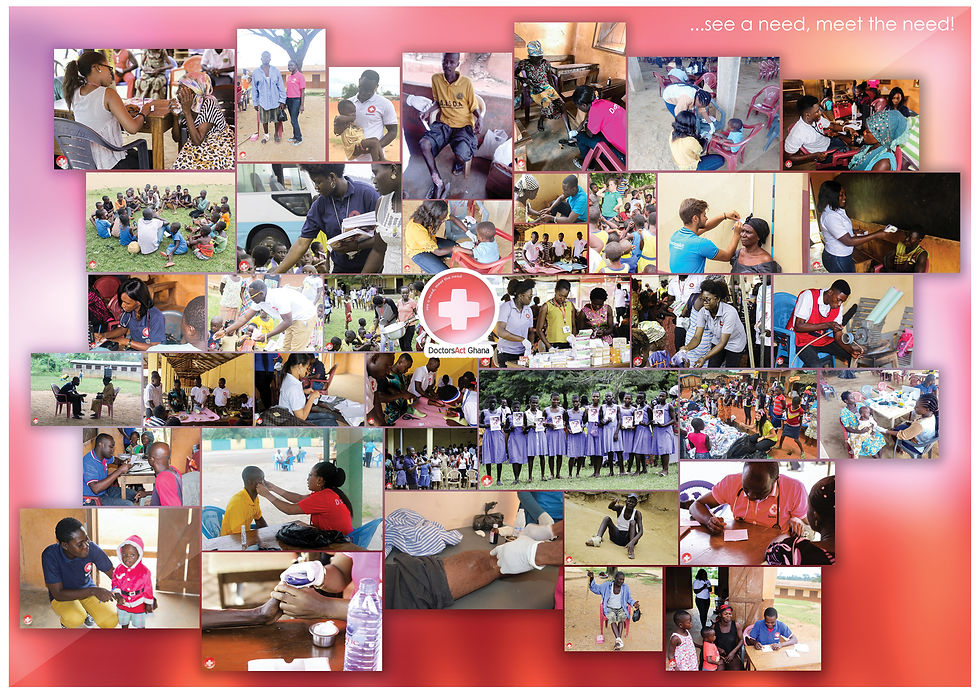BEAUTY IN SMALL DEEDS 2018 PROJECT - BACKGROUND
The prevalence of major chronic non-communicable diseases and their risk factors has increased over time and contributes significantly to the Ghana's disease burden. Conditions such as hypertension, stroke and diabetes affect both the young and the old, urban and rural communities, and as well as the wealthy and poor. The high cost of care drives the poor, who already have limited access to health care services, further away and into poverty. Lay awareness and knowledge are limited, health systems and services (biomedical, ethnomedical and complementary) are weak, and chronic disease policies are nonexistent. These factors contribute to increasing risk, morbidity and mortality.
Malaria has been a major cause of poverty and low productivity accounting for about 32.5 percent of all OPD attendances and 48.8 percent of under five years admissions in the country. (NMCP annual report, 2009). Malaria is the leading cause of death for children under five. Another critical period is during the first 30 days of a child’s life (the newborn period).
The attempt to control malaria in Ghana began in the 1950s. It was aimed at reducing the malaria disease burden till it's no longer of public health significance. It was also recognized that malaria cannot be controlled by the health sector alone therefore multiple strategies were being pursued with other health related sectors. In view of this, interventions were put in place to help in the control of the deadly disease.
Ghana’s capacity and willingness to harness its economic and social potential have yielded impressive results, particularly over the last decade. As facilities at community level have gradually improved and incomes have risen, increasing numbers of people have gained access to basic services. However, the progress is not uniform.
In Ghana’s northern regions, the majority of the population continues to go without, and those who are poorest are seeing little benefit from Ghana’s growth. Malnutrition is a significant indirect cause of child mortality, contributing to one-third of all childhood deaths. Although levels of malnutrition in Ghana have dropped, 23% of children are stunted and 57% are anaemic. Nutrition is particularly poor in Northern Ghana, where almost two in every five children are stunted and more than 80% of children suffer from anaemia.
Because of the importance we at DoctorsAct place on quality healthcare and nutrition in human and economic development, we are taking concrete steps in our annual Beauty in Small Deeds Project to reduce the incidence non-communicable disease in adults and malaria and malnutrition in children.
At DoctorsAct we attach great importance to health care and health related states as reflected in targets 1C, 4A, 5 and 6C of the Millennium Development Goal’s (MDG), which identify the need to reduce hunger and mortality among children under five years of age, as well as increase universal access to universal reproductive health and reduce the incidence of malaria and other major diseases.
In partnership with The Community Hospitals and other stakeholders, our able team will be at Akim Oda and surrounding communities from 29th July - 4th August, 2018 to attend to the health needs of more than the five thousand inhabitants by medical screening, education and empowerment.
Each year of over 30 students, volunteers and health care professionals play an active role in the success of this project, organising fundraisers, awareness campaigns, running marathons, health lectures and talk shows all in order to raise money for the Beauty in Small Deeds Humanitarian Project.
Our organization budget is met mainly through pledges from voluntary donations of family, friends, volunteers and corporate bodies and a variety of other forms of donations. DoctorsAct is committed to investing 100 percent of donations received into front-line ministry.
Our team will sincerely appreciate any donation you are able to offer.
Kindly donate choosing one of the options below that suits you best.
1. GlobalGiving
https://www.globalgiving.org/projects/restore-healthcare-to-rural-communities-in-ghana/
2. PayPal (donate@doctorsactglobal.com)
3. Gofundme (visit https://www.doctorsactglobal.com/financial-intergrity)
3. Bank transfer (visit https://www.doctorsactglobal.com/financial-intergrity)
4. Mobile Money Transfer (Ghana only - visit https://www.doctorsactglobal.com/financial-intergrity)
Thank you in advance for supporting a worthy cause.
Please don't hesitate to contact us if you have any enquiries or comments about the project at: admin@doctorsactglobal.com or info@doctorsactghana.com


























